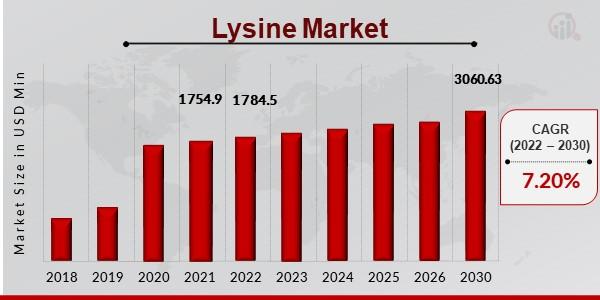Lysine Market Global Analysis, Size, Share, and Industry Demand (2024-2030)"

Global Lysine Market Outlook
Market Research Future estimates the global lysine market to be valued at USD 1.78 billion in 2022 and is projected to reach USD 3.06 billion by 2030, exhibiting a compound annual growth rate (CAGR) of 7.20% during the forecast period (2022-2030) [1]. This growth can be attributed to several key factors:
- Rising Demand for Animal Protein: The growing global population and increasing disposable income in developing economies are driving the demand for animal protein sources like meat, poultry, and fish. Lysine is a crucial component of animal feed, as it enhances growth performance and feed efficiency in livestock.
- Focus on Improved Animal Nutrition: Modern animal husbandry practices emphasize balanced and efficient nutrition for animals. Lysine supplementation ensures animals receive adequate amounts of this essential amino acid, leading to improved health, better meat quality, and higher productivity.
- Growing Awareness of Lysine Benefits in Humans: Lysine plays a role in muscle building, tissue repair, and immune function in humans. The growing awareness of these benefits is increasing the demand for lysine in dietary supplements and food fortification applications.
Market Segmentation
The lysine market segmented based on various factors, including:
- Type:
- Lysine Hydrochloride (L-HCl): The most common form used in animal feed due to its high purity and cost-effectiveness.
- Lysine Monohydrate: Another popular form with slightly lower lysine content than L-HCl.
- Other forms: Less common options include liquid lysine and lysine sulfate.
- Application:
- Animal Feed: The dominant application segment, accounting for over 90% of the market share.
- Food & Dietary Supplements: A growing segment driven by the increasing demand for functional foods and sports nutrition products.
- Pharmaceuticals: Lysine finds use in certain medications and wound healing products.
- Others: A minor segment encompassing applications in cosmetics and industrial uses.
- Region:
- Asia Pacific: The largest regional market due to the rising demand for animal protein in this densely populated region.
- North America: A well-established market with a focus on advanced animal nutrition practices.
- Europe: A mature market with stringent regulations impacting lysine production and usage.
- Latin America: A growing market driven by increasing meat consumption and expanding aquaculture.
- Middle East & Africa: An emerging market with potential for growth due to rising disposable incomes and development of the livestock sector.
Key Market Drivers and Challenges
Drivers:
- Increasing demand for animal protein
- Growing focus on animal nutrition and improved feed efficiency
- Rising awareness of lysine benefits in human health
- Development of functional foods and fortified food products
- Expanding applications in pharmaceuticals and other industries
Challenges:
- Volatile raw material prices: Sugarcane, a key feedstock for lysine fermentation, can experience price fluctuations impacting production costs.
- Stringent regulations: Regulatory requirements for lysine production and usage can vary across regions, posing challenges for manufacturers.
- Environmental concerns: The fermentation process for lysine production can generate environmental concerns, requiring manufacturers to adopt sustainable practices.
- Competition from alternative protein sources: The growing interest in plant-based protein alternatives could potentially impact the demand for animal feed, and consequently, lysine.
Competitive Landscape
The lysine market is dominated by a few major players, including:
- Ajinomoto Animal Nutrition (Japan)
- Archer Daniels Midland Company (US)
- CJ CheilJedang (South Korea)
- Evonik Industries (Germany)
- Novus International (US)
- ADM (Archer Daniels Midland Company) (US)
- Buhler (Switzerland)
These companies compete on factors like product quality, production capacity, geographical reach, and innovation in lysine production technologies.
Future Outlook
The lysine market share is expected to witness steady growth in the coming years, driven by the aforementioned factors. Here are some potential trends that could shape the future of the market:
- Technological advancements: Developments in fermentation technology and alternative feedstocks can lead to more efficient and sustainable lysine production.
- Focus on organic and non-GMO lysine: The increasing demand for organic and non-GMO animal products could drive the development of organic
Request Free Sample - Receive a complimentary sample of our report to evaluate the quality and relevance of our research.
About Market Research Future:
At Market Research Future (MRFR), we enable our customers to unravel the complexity of various industries through our Cooked Research Report (CRR), Half-Cooked Research Reports (HCRR), Raw Research Reports (3R), Continuous-Feed Research (CFR), and Market Research & Consulting Services.
MRFR team have supreme objective to provide the optimum quality market research and intelligence services to our clients. Our market research studies by products, services, technologies, applications, end users, and market players for global, regional, and country level market segments, enable our clients to see more, know more, and do more, which help to answer all their most important questions.
To stay updated with technology and work process of the industry, MRFR often plans & conducts meet with the industry experts and industrial visits for its research analyst members.
Contact us:
Market Research Future (part of Wantstats Research and Media Private Limited),
99 Hudson Street,5Th Floor, New York, New York 10013, United States of America
Sales: +1 628 258 0071(US) +44 2035 002 764(UK)
Email: Sales@marketresearchfuture.com
- Art
- Causes
- Crafts
- Dance
- Drinks
- Film
- Fitness
- Food
- Games
- Gardening
- Health
- Home
- Literature
- Music
- Networking
- Other
- Party
- Religion
- Shopping
- Sports
- Theater
- Wellness
- IT, Cloud, Software and Technology


